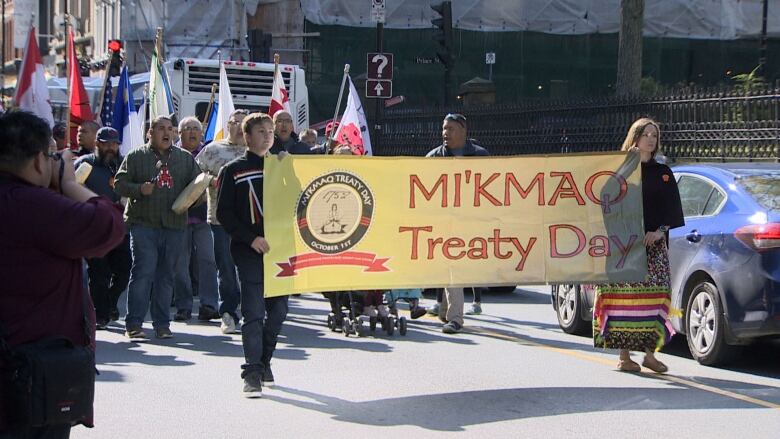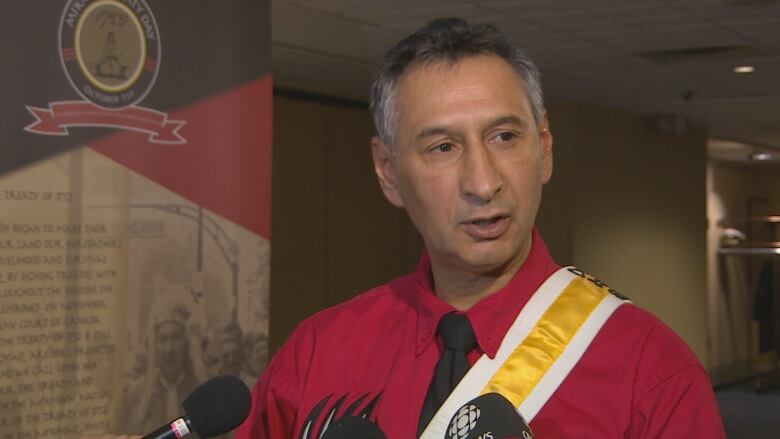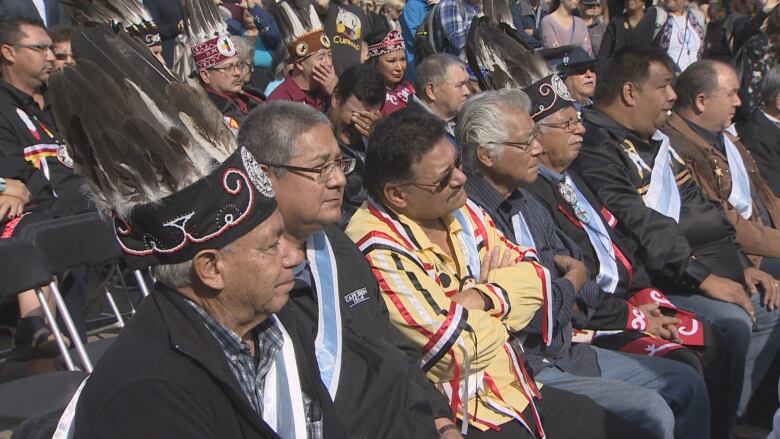Treaty Day recognizes special relationship between Crown, Mi'kmaq
'I love Canada ... but it's important that Canadians know we're their allies, not their subjects'

Treaty Day in Nova Scotia was proclaimed in 1993 but two people participating in events Mondayremembered back to 1986 when the occasion unofficially began in Halifax.
Mayor Mike Savage noted that a group of Mi'kmaqleaders and military veterans held a march downtown that year to commemorate a Supreme Court of Canada ruling that upheld the Treaty of 1752 between the Mi'kmaq and the Crown.It was attended by then-mayor Ron Wallace and kicked off what eventually became an annual event across the province, also launchingMi'kmaqHistory Month.
Donald M. Julien, executive director of the Confederacy of Mainland Mi'kmaq, also addressed the crowd that gathered Monday at Grand Parade.
He said the large gathering of people, including Mi'kmaq leaders, politicians and other dignitaries, was very different from that much smaller event 32 years ago when Wallace was the only government officialthat showed up.

"Theywere afraid to commit themselves under a treaty. They didn't understand it, they didn't appreciate it," Julien told a crowd of hundreds.
"But today we arestarting to understand and appreciate that we are all treaty people. It takes two people to sign a [treaty] document."
Julienrecognized that the numberof Mi'kmaqveterans has dwindled since that first march.
"They volunteered in the First World War, Second World War and the Korean Conflict and they continue to volunteer during peacetime," he said.
DownieWenjackroom at city hall
Savage said Treaty Day also marks progress in truth and reconciliation goals.
"I believe we are taking important steps at city hall to determine how we build a cultural hub for Mi'kmaqand non-Mi'kmaqalike.Adding Mi'kmaw language to more of our welcome signs commissioning public art as we have on the [Halifax] Common or adding interpretive panels on culturally significant locations such as Point Pleasant Park," the mayor said.
"I think we will all benefit from these kinds of visible acknowledgements. We're the first city to have a Downie Wenjack room at city hall."
The space, called the GordDownieandChanieWenjackFund legacy room,is a board room inside city hall. Its purposeis to provide information about Indigenous history in Canada and work towardreconciliation with First Nations peoples.

Andrew Denny says Oct. 1 is an important day in the lives of the Mi'kmaqpeople, recognizingpeace and friendship treaties dating back nearly 400 years, to the early 1700s.
That makes all Nova Scotians and all Canadians treaty people, along with the Mi'kmaq, said Denny,a resident ofEskasoniFirst Nation in Cape Breton andGrandKeptinof theMi'kmaqGrand Council.
"I love Canada ... but it's important that Canadians know we're their allies, not their subjects," he said.
Denny was in Cape Breton's Wagmatcook First Nation last week to speak on the significance of Treaty Day.
He told students to approach the world through the Mi'kmaqpoint of view.
'Our wealth is the family'
"In the Mi'kmaqpoint of view, everything revolves around our language," he told Steve Sutherland, host of CBC's Information Morning Cape Breton program.
"It is important that they learn their language, because the Mi'kmaqpoint of view doesn't just look at wealth. Our wealth is the family. It's the friendship. It's the allies. Your neighbours. It's getting along, working together and making sure that everyone survives. Not just the strongest."

Denny told the students about a day when he was in Grade 10 at Riverview Rural High School in Sydney and heard his class was going to learn about Mi'kmaq history.
"I was so proud and happy that we were going to talk about my people," he said.
"And when you looked at the history book of the time, it had three sentences in the paragraph. It stipulated that the Mi'kmaqwere savages. The Mi'kmaqwere warlike. The Mi'kmaqwere uncivilized.
"I just looked at the textbook and I raised up my hand, and of course poor old Mr. Johnson was the teacher at the time, and I told him, 'This is wrong. This is not our history.' And being the son of Grand Captain Alec Denny, that was my first impression of our culture at my high school."
That was years ago. Since then, Denny said, a more accurate history of the Mi'kmaq people and of the peace and friendship treaties has been included in the Nova Scotia schools curriculum.
In addition, high schools have been built in Nova Scotia's First Nation communities, which has helped set the stage for a better future, he said.
Schools having significant effect
"Our kids are graduating at an 85 to 90 per cent rate and going off to university," Denny said. "We stress the fact that we're not sending them to school because we don't want to babysit them. We are sending them to learn that they can be self-sufficient, as our ancestors always were.
"Our young people are more engaged, they're more eager. They don't look down upon themselves anymore. They look at the fact they come from a nation who has withstood the trials and tribulations of history and we are still here, and we are still holding out our hand to our ally. Let's walk together.
"The strength of a nation is that you can hold out your hand and say, 'We walk together.'"
With files from Paul Palmeter
With files from Paul Palmeter












_(720p).jpg)


 OFFICIAL HD MUSIC VIDEO.jpg)
.jpg)



























































































